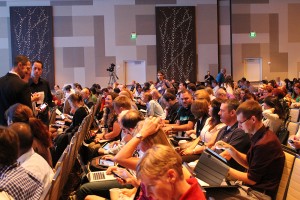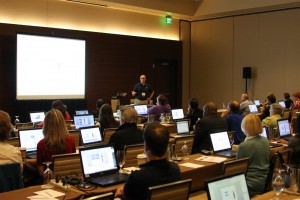Enhancing Professional Development for You and Your Team
I remember one of the first conferences I attended years ago. I went with two other team members from my organization. None of us were what you would call “experienced” with industry conferences. As such, we made some mistakes in our planning.
 For one thing, there was a lot of “we” in our plans. “We’re going to the workshop.” “We’re going to this session.” For the most part, a lot of what we did we did as a team. It was a great experience, but in hindsight it was extremely limiting.
For one thing, there was a lot of “we” in our plans. “We’re going to the workshop.” “We’re going to this session.” For the most part, a lot of what we did we did as a team. It was a great experience, but in hindsight it was extremely limiting.
We were in different roles, and at different stages in our careers. This was before the age of elearning. I was a training director, and I had brought with me two “trainers,” one a more seasoned classroom facilitator and another a classroom facilitator who had an increasing responsibility for instructional design.
I see this a lot amongst groups at events, and it was definitely a mistake for us to spend as much time together at the conference as we did. It was a good experience for us, but one that could have, and should have, been much better.
The following year we tried something different. This time four members of the organization attended the conference. Our agenda planning started from a different place–our individual coaching sessions. Each of us had skills we were working on developing in ourselves, skills that were discussed in our regular coaching sessions.
These desired skills were the basis of the plans we set for our conference agendas. We each set our own individual plans for the event and focused on the areas each of us needed to develop. There were times some of us were in the same concurrent sessions, but when it happened it was based on the overlap of our individual plans, not on group agenda planning. When it came to workshops, each of us attended a different workshop tailored to the specific skills we were looking to develop.
I found this to be a much more effective way for my team to attend a conference, as it provided a much deeper experience. Here are some of the benefits I saw with this approach.
Personalization
Since each individual chose the sessions and workshops they found most interesting, there was more buy-in and interest in the sessions each person attended. It was a much more personal experience than “These are the sessions we’ll be attending.”
Expanding the Overall Content
The individual plans also cast a much wider net to the overall content the team was exposed to during the conference. When we shared what we learned during sessions, we were able to learn from sessions we didn’t attend personally.
Reflection
The sharing of what we each learned was an important part of the overall experience. About a week after the conference the four of us held a debriefing that included the members of the team who were not able to attend. These sharing sessions provided a great opportunity for each of us to reflect on what we learned at the conference, and to contextualize it in a way that applied to our organization.
Extending Beyond the Event
This approach also extended the experience well beyond the few days of the event. Our planning for the event started weeks before during our coaching sessions. Our reflections, debriefings, and coaching action plans allowed what we learned to be revisited and reinforced for weeks and months after the event ended.
Expanded Networks
For many of my team members–myself included–when sitting in a large group of people with a few that we know well, we’ll likely stick with the people we know. When you attend a session on your own, you don’t have that option. You’re gently pushed into connecting with people you don’t know, and thus expanding your professional network.
 Of course, all this assumes that the event you’re choosing to attend has a wide enough array of workshop and session options to provide a personalized experience for each member of the training team. At the Learning Solutions Conference and Expo, we have 18 different Certificate Programs scheduled to be conducted by industry experts, providing something for each member of your training team. Here are a few examples:
Of course, all this assumes that the event you’re choosing to attend has a wide enough array of workshop and session options to provide a personalized experience for each member of the training team. At the Learning Solutions Conference and Expo, we have 18 different Certificate Programs scheduled to be conducted by industry experts, providing something for each member of your training team. Here are a few examples:
- The Accidental Instructional Designer (Cammy Bean)
- Enterprise mLearning: From Proof of Concept to Pilot (Robert Gadd)
- Mastering eLearning Project Management (Lou Russell)
- Knowledge Management Intensive (Marc Rosenberg and Steve Foreman)
- AGILE Instructional Design: Keeping Pace with the Speed of Change (Conrad Gottfredson)
- Creating True Scenario-based eLearning in Adobe Captivate 7 (Joe Ganci)
- eLearning, Strategically: Enhancing Organizational Performance Through Technology (Clark Quinn)
- Performance Support: A Recipe for Successful Implementation (Molly Petroff)
These are just a few of the pre-conference programs available at Learning Solutions. With each one exploring a different topic, it’s likely you’ll find something that applies to your work, and to the work of each member of your team.

Leave a Reply